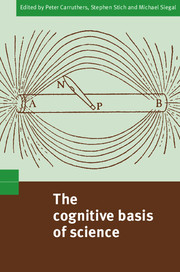Book contents
- Frontmatter
- Contents
- List of contributors
- Preface
- 1 Introduction: what makes science possible?
- Part one Science and innateness
- Part two Science and cognition
- 5 Science without grammar: scientific reasoning in severe agrammatic aphasia
- 6 Causal maps and Bayes nets: a cognitive and computational account of theory-formation
- 7 The cognitive basis of model-based reasoning in science
- 8 Understanding the role of cognition in science: the Science as Category framework
- 9 Theorizing is important, and collateral information constrains how well it is done
- 10 The influence of prior belief on scientific thinking
- 11 Thinking about causality: pragmatic, social and scientific rationality
- Part three Science and motivation
- Part four Science and the social
- References
- Author index
- Subject index
7 - The cognitive basis of model-based reasoning in science
Published online by Cambridge University Press: 23 November 2009
- Frontmatter
- Contents
- List of contributors
- Preface
- 1 Introduction: what makes science possible?
- Part one Science and innateness
- Part two Science and cognition
- 5 Science without grammar: scientific reasoning in severe agrammatic aphasia
- 6 Causal maps and Bayes nets: a cognitive and computational account of theory-formation
- 7 The cognitive basis of model-based reasoning in science
- 8 Understanding the role of cognition in science: the Science as Category framework
- 9 Theorizing is important, and collateral information constrains how well it is done
- 10 The influence of prior belief on scientific thinking
- 11 Thinking about causality: pragmatic, social and scientific rationality
- Part three Science and motivation
- Part four Science and the social
- References
- Author index
- Subject index
Summary
The issue of the nature of the processes or ‘mechanisms’ that underlie scientific cognition is a fundamental problem for cognitive science, as is how these facilitate and constrain scientific practices for science studies. A full theory of human cognition requires understanding the nature of what is one of its most explicitly constructed, abstract and creative forms of knowing. A rich and nuanced understanding of scientific knowledge and practice must take into account how human cognitive abilities and limitations afford and constrain the practices and products of the scientific enterprise. Here I want to focus on the issue of the cognitive basis of certain model-based reasoning practices – namely, those employed in creative reasoning leading to representational change across the sciences. Investigating this issue provides insights into a central problem of creativity in science: how are genuinely novel scientific representations created, given that their construction must begin with existing representations? I will start by considering methodological issues in studying scientific cognition; then address briefly the nature of specific model-based reasoning practices employed in science; and finally provide outlines of an account of their cognitive basis, and of how they are generative of representational change.
How to study scientific cognition?
The project of understanding scientific cognition is inherently inter-disciplinary and collaborative. It requires a detailed knowledge of the nature of the actual cognitive practices employed by scientists; knowledge of a wide extent of existing cognitive science research pertinent to explaining those practices, such as on problem-solving, conceptual change and imagery; and employment of the customary range of cognitive science methods used in investigations of specific aspects of scientific cognition.
- Type
- Chapter
- Information
- The Cognitive Basis of Science , pp. 133 - 153Publisher: Cambridge University PressPrint publication year: 2002
- 135
- Cited by



